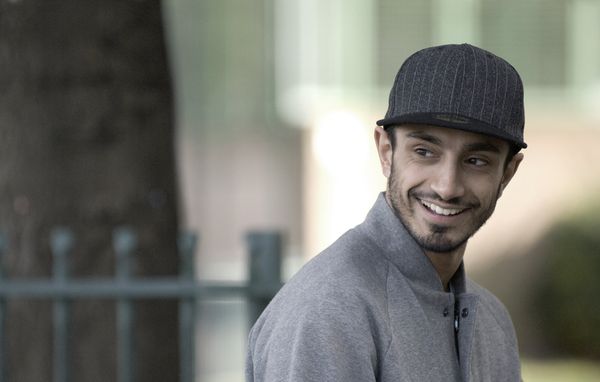Eye For Film >> Movies >> Ill Manors (2012) Film Review
Ill Manors
Reviewed by: Owen Van Spall

It's often said that as Britain lurches into austerity, the protest songs that used to flare up in decades past raging against war, poverty, industrial decline and inner city alienation are bizarrely absent from today's cultural landscape. Plan B AKA Ben Drew, musician, actor and now director, is one artist moving into that gap.
First in early 2012 came a single and accompanying music video - Ill Manors - which was an unashamedly visceral visual medley of contemporary urban alienated London youth that drew on images of the 2011 London riots that provoked such a polarizing wave of outrage, soul-searching and accusations. Hate, rage, exclusion, and class are all thrown in your face in the video. In a BBC Radio 1extra interview in March 2012 Drew said: "I need to get under people's skin. This is a subject that has been swept under the carpet since it happened. I want to know why it happened, and how we are going to prevent it happening again. This is issue we've had in society for probably over 30 years, and it's never been front of the queue until the riots happened."

Now we have Ill Manors the feature film, a project long in development and long delayed for various reasons, largely due to the difficulty getting financing, and then the need for Drew to fit editing and postproduction in with touring and album work. It was shot on location in 2010, in the Forest Gate areas of London, drawing in some elements from Drew's experience growing up and witnessing life around those parts.
It uses a mix of recognisable British talent, such as Riz Ahmed (Four Lions) and a clutch of non-professional and relatively unknown actors. Those who have seen the earlier music video and heard the single will recognise many familiar faces, locations, and themes - it is a sort of primer for what to expect. In the same BBC interview, Drew spoke of the overall project about wanting to project a "visceral energy … just like those horrible pictures we see on cigarette packets that are designed to shock us into being aware of our actions".
This London-based urban crime film that stitches together several interweaving plots over the course of one day and night, certainly delivery those shocks, an unrelentingly wave of them in fact. Across Forest Gate, we see a group of characters hustle, steal, pimp, curse, and die as a hip-hop narration acts as a kind of chorus and commentary linking the tales. Only a lucky few escape. As the time-lapse opening credit sequence makes clear, it all circles around the estate blocks of London's Newham borough, whose towers loom over everything, as the people scurry about in the shadows below. The same highly-stylised opening sequence, which takes us across the chain of drug circulation from factory to dealer to user and back again, also makes it clear that this is an alternate and cyclical world and economy of crime and addiction that has sprung up in the richest city in the UK. What else is there for the excluded?
Small-time dealer Aaron (Ahmed), one of the more sympathetic characters given his world-weariness and growing doubts about 'the life' (though actually acting on any of this moral uncertainty isn't really his thing) is probably our window into the world and the character most central to the interlocking events. On one miserable night, he is forced to tag along as his highly-wired and ultra-aggressive pal Ed (Ed Skrein) forcibly pimps out crack-addicted local hooker Michelle in order to pay for a mobile phone which Ed, without any evidence, believes she stole from him.
Aaron's supplier, the loud-mouthed leering Kirby (Keef Coggins), is not really enjoying his recent release from jail given up-and-coming drug kingpin Chris (Lee Allen) has moved onto his turf in the meantime. Chris's sister on the other hand, is soon within Kirby's clutches as he tempts the impressionable girl with promises of a modelling contract. One of Chris's dealers, Marcel, is also in the game of luring in the youth; tempting a baby-faced schoolkid into his crew and offering him easy money - providing the boy is willing to get his hands very dirty with a hit. If Aaron didn't have enough moral dilemmas to deal with by partnering with Ed, he also ends up having to hold onto a baby which battered mob-escapee immigrant Katya (Natalie Press) drops literally into his lap. He could take it to social services, but Ed sees a way to make quick cash... by selling it.
Merciless is probable the best way to describe the plot that drags its already deprived (and depraved) characters further and further down. In fact, the waves of misery come almost too thick and fast, the camera lingering on the suffering maybe a little too long, the hip hop chorus lament further emphasising the endless litany of hopelessness that substitutes for a life for most of these unfortunates. You can't accuse Drew of not taking this subject matter seriously and not being able to provoke and shock with some truly eye-opening scenarios, but there is a fine line between ensuring gritty contemporary subject matter is portrayed harshly enough to command attention, and actually pushing it to a level of distraction where the audience becomes deadened.
The directing style is also somewhat eratic, ranging from Nil By Mouth-type social realism, handheld footage, urban music video style slo-mo shots, sequences with body-mounted cameras, and shifts to verite handheld camera phone footage. Though effective in some parts as commentary on the ways urban youth are portrayed and the tools they use to view their own world, these also feel gimmicky and random and means the film's flow never seems to settle. Likewise the hip hop chorus soundtrack (which will form the accompanying album) starts off as atmospheric device and angles the film as a sort of gritty urban musical, but it also is distracting and intrusive at times.
For a film so determined to show a group of people who are facing no escape, it is strange that at the climax Drew seems to pull back, allowing the truly depraved and unjust to get their just desserts while the government agencies suddenly turn up to do their jobs. This is all the more odd given Drew's willingness in earlier work and interviews to confront the wider political situation that casts people out into ghettos like this where there are no happy endings. The film doesn't really move up to fully implicate wider society or government policies, instead focusing, through flashback sequences, on the chain of disasters in each character's background that seem more to do with broken families, absent parents, and bad choices which can be reversed by better choices or by walking away from the life.
Though it is flawed and uneven and can't escape the wide shadows of the London gangsta/hood films of the last few decades, Ill Manors does showcase a bold and confrontational directing style and subject matter, and does feature some evocative London locations (note the ever present Millennium and Olympic domes frequently framed in the background, like UFO's of unobtainable wealth dropped into the deprived landscape). Drew will no doubt achieve his main aim with this film - which is to get people talking.
Reviewed on: 06 Jun 2012

















